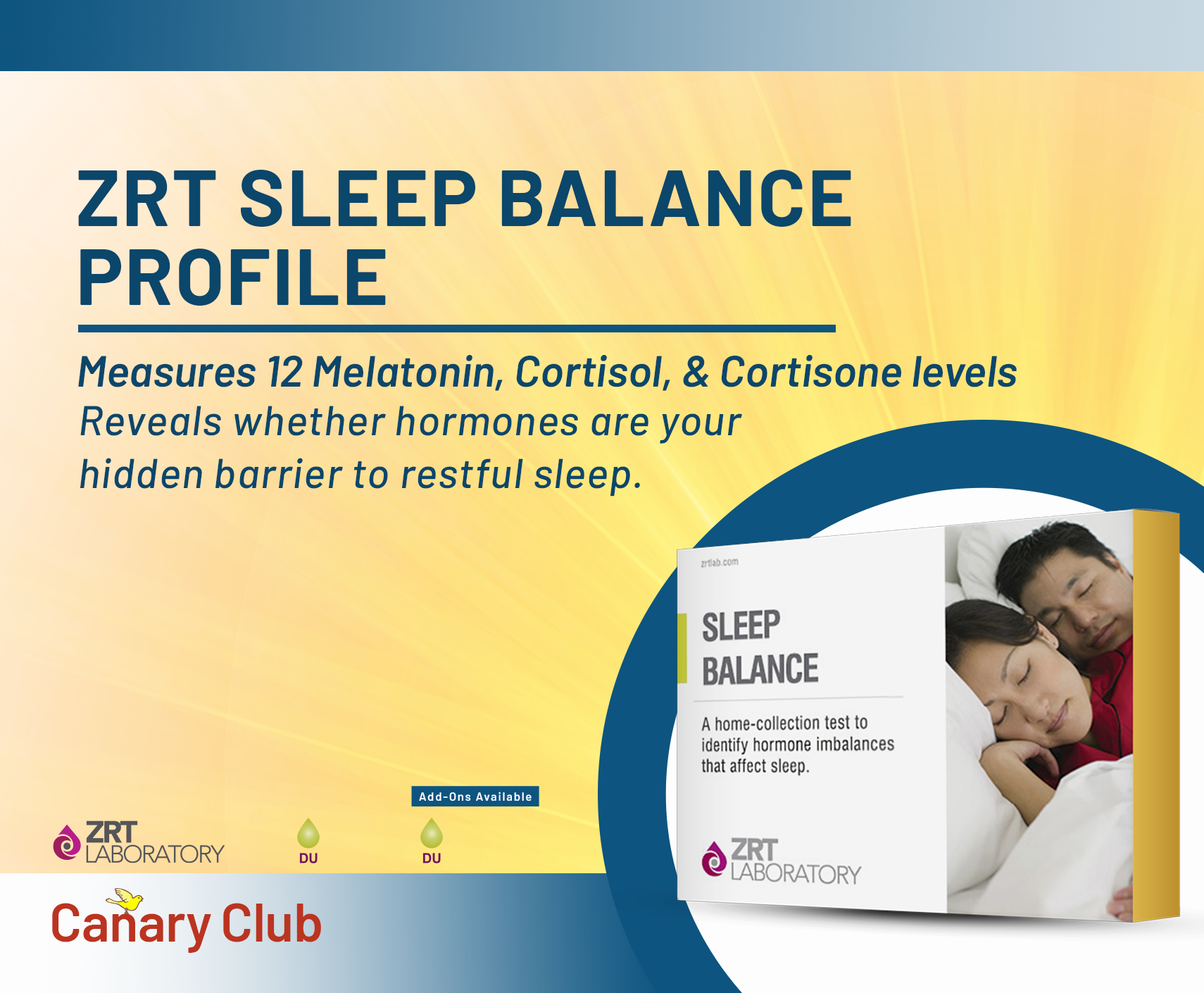Uncovering the Causes of Your Sleepless Nights
One thing we can probably agree on is that quality sleep is a blessing for those that can get it.
For some of us, our sleep can be disturbed in many ways. In sleep, we look for how fast we fall asleep, stay asleep, the total length of sleep, and how much daytime energy we have after we have slept.
Don't worry if you are one of the 60 million suffering from recurring sleep disturbances. As of now, there's an easier way to determine whether hormone imbalances contribute to your sleep loss.
Avoid Medicating Symptoms of an Underlying Hormone Imbalance
Taking a sleeping prescription or OTC pill every night, for weeks or months, doesn't address the underlying problem.
Yet this approach of self-medicating ourselves can easily turn into a nightly habit to get natural sleep. We are masking the real problem. In the past, we were taught, there were few other options.
Only recently has there been a way to test for the real cause of our poor sleep quality. Before now, many generations have been conditioned to medicate the symptoms with pills or liquids to get a quick fix.
We've talked about the symptom of being tired but wired awhile back. When we test, we often see depressed cortisol levels in the morning and elevated cortisol levels at night. Having high cortisol hormone at night is the reverse of what we need.
Being tired and wired is only one symptom of sleep disturbances and insomnia. We can now test for many of these additional symptoms by measuring the hormones and neurotransmitters involved in sleep.
Sleep Balance Hormones
ZRT Sleep Balance Profile looks closely at two hormones influencing sleep by collecting four dried urine samples. An optional add-on to this test profile will assess the neurotransmitter levels related to sleep disturbances from the same four samples.
ZRT Sleep Balance Profile pinpoints imbalances of melatonin and cortisol circadian rhythms associated with acute or chronic sleep disturbances.
- Cortisol hormone should be lowest during sleep. Elevated levels may cause insomnia, or fitful sleep. When the morning alarm goes off and you are still awake, cortisol levels may be the culprit.
- Melatonin hormone is considered the sleep hormone. Rising levels at night help you sleep more soundly. Low levels at night may wake you up, cause shallow sleep, or leave you fatigued during the day.
You sleep better when these two hormones cycle in inverse balance to one another. By sampling these two hormones in dried urine four times in a 24 hour period, the lab report will graphically depict your hormone levels throughout the course of a full day. You will see a picture of the deviations in amplitudes and phasing affecting circadian rhythms related to melatonin levels in ratio to cortisol levels.
Consider this profile when there are symptoms of an inability to get to sleep, frequent waking, or chronic sleeplessness affecting vitality and cognition.
ZRT Sleep Balance Profile may be helpful in alerting attention to other conditions.
Reduced melatonin levels may indicate the presence of some diseases, such as some mood disorders, types of dementia, substance abuse, severe pain, cancer, and diabetes type 2.
When cortisol levels are too high for too long, it can be more harmful than helpful like disrupting sleep. High levels over a long time may cause weight gain, high blood pressure, negatively impact mood, reduce your energy levels, create anxiety feelings, and contribute to diabetes.
ZRT Sleep Balance Profile gives a detailed report on the 24-hour (diurnal) inter-related levels cortisol and melatonin hormones. Consider selecting this test profile when you have these co-occuring symptoms:
- High cortisol is indicated by
- primarily—any nightly symptoms of insomnia, restless sleep, disturbed sleep, or feeling tired and wired
- secondary symptoms of daytime anxiety, sugar cravings, increased belly fat
- Low melatonin is indicated by
- primarily—any symptoms of excessive fatigue throughout waking hours, insomnia at night, restless sleep, disturbed sleep
- secondary symptoms of daytime depression and/or anxiety
Selecting this profile is highly suggested when you have daytime sleepiness so severe it interferes with work, decision making, and social functioning.
Long-term sleep deprivation—defined as six or fewer hours per night—masked by taking ineffective medications can cause depression, obesity, diabetes, and affects your immune system to fight off viruses.
Severe dysfunction of sleep quality may be better assessed with the purchase of the optional add-on: ZRT Sleep Balance Profile Add-on Diurnal Norepinephrine and Epinephrine.
Sleep Balance Diurnal Norepinephrine and Epinephrine (Optional Add-on)
ZRT Sleep Balance Profile Add-on Diurnal Norepinephrine and Epinephrine can be purchased to give a fuller picture when there are adrenal issues. This optional add-on can measure in combination with cortisol and melatonin the norephinephrine and epinephrine levels from the same four samples.
Epinephrine, also known as adrenaline, is produced by both the adrenal glands where it is known as a hormone, and a small amount is produced in the brain where it is known as neurotransmitter. Circulating ephinephrine is derived 100% from the adrenal glands.
Norephinephrine, also known as noradrenaline, is both a hormone, produced by the adrenal glands, and a neurotransmitter, a chemical messenger which transmits signals across nerve endings in the body. Approximately 20% of circulating norepinephrine is produced by adrenals and the rest (80%) by sympathetic nerves.
When produced by the adrenal glands, the epinephrine/norepinephrine response is hormonal in nature as opposed to a neural one, which is why these neurotransmitters are sometimes called hormones.
Why Consider the Add-On?
Together with cortisol, the catecholamines norepinephrine and epinephrine help the body respond to life. A healthy balance of rhythmic secretions of cortisol, norepinephrine and epinephrine help tune our responses to situations.
When these three hormones are working together properly, your body will respond to "fight or flight" conditions quickly and then subside back to normal. Your biological response, usually an elevated heart rate and rapid breathing, will return to normal. Your emotional response, a "tunnel vision" cutting off outside thoughts and focusing on a single event, will relax and open up to being normal once again.
There are those individuals that suffer prolonged periods of continued "fight or flight" response. Repeated "panic attacks" while commuting, elevated blood pressure and heart rate on a daily basis, responding to daily changes in the care of a chronically ill family member, continued weekly anxiety, non-stop "butterlies in the stomach" sensation. When your daytime experience is filled with these prolonged sensations, they may stimulate wakefulness and contribute to sleep deprivation at night.
Consider the optional add-on when you are experiencing unusally long periods of "fight or flight" response causing poor sleep. There may be an underlying adrenal dysfunction, or other biological factors.
If over time, norepinephrine, epinephrine, and cortisol levels are chronically high, this may establish a stress loop in your body, making it unable to self-regulate and to regain homeostasis. Over several years, this may increase susceptibility to disease, including cardiovascular disease, dementia, diabetes.
Across a lifespan, our hormonal system is in a healthy balance when it can handle stress and return to normal quickly.
Regular sleep is a sign of a healthy body.
When you can't get sleep, your body is telling you something is wrong. Taking action, not pills, is a better therapy course.
Your Hormone Management Testing Plan
When you know you have done everything you can to manage your sleep quality—yet nothing has worked—it is time to consider testing.
- Step 1: Start by selecting the ZRT Sleep Balance Profile, using the guide below.
- Step 2: Take the test to establish the starting hormone baseline at the onset of your plan. Consider developing your plan alongside:
- a licensed health care provider for medical conditions, especially for severe "out of normal range" results
- or a health care consultant for nutrition and supplements that will support your results
- Step 3: Develop a plan based on your hormone test results, establishing a one-year or more outlook.
- Be diligent to address the factors you can, such as work stress, poor diet, lack of exercise.
- Keep logs of your intakes, and daily routines related to your hormone test results.
- Step 4: After 6-12 months of actively working on your plan, take the same test again to determine your progress.
Our ZRT Sleep Balance Profile can help you assess factors disturbing your sleep quality.
Alternatives to ZRT Sleep Balance Profile
ZRT Cortisol Awakening Response
When your symptoms aren't listed in the symptoms related to cortisol vs. melatonin vs. norepinephrine vs. epinephrine ratios mentioned above, consider purchasing the ZRT Cortisol Awakening Response CAR instead—also called CAR—when you have chronic stress conditions that may be impairing your ability to wake up in the morning and without daytime fatigue. Cortisol levels need to be higher in the morning to get you going for the day, CAR is a helpful tool for looking at the body's morning awakening response. CAR is primarily focused on assessing the body's response to chronic stress which might be disturbing sleep.
ZRT Vitamin D Profile
Sleep needs melatonin. Studies suggest that melatonin levels might not rise at night due to a lack of vitamin D.
Consider purchasing the ZRT Vitamin D Sunshine Profile along with your ZRT Sleep Balance Profile.
Sleep is something we often take for granted and discuss frequently when it is absent. After all, humans are wired that way—we have a physiological need to sleep. And when we don’t get enough good quality sleep, we just don’t feel right. What many folks don’t realize is just how important vitamin D is for sleep.
In a recent study, sleep quality was assessed in participants with sleep disorders. The authors reported that vitamin D improved sleep quality, reduced sleep latency, raised sleep duration and improved subjective sleep quality. This and other studies highlight the important and powerful connection between vitamin D and sleep.
The mechanism of exactly how vitamin D contributes to a healthy slumber is not quite elucidated. At least in part, it appears that it might have something to do with vitamin D’s regulation of tryptophan hydroxylase (TRPH) expression – the rate-limiting enzyme in serotonin (and consequently melatonin) production. Vitamin D potentiates the expression of neuronal TRPH to stimulate the appropriate production of serotonin in the brain. Without sufficient serotonin production, melatonin levels will not rise appropriately to give the body that signal to go to sleep at night.
(1) https://www.ncbi.nlm.nih.gov/pmc/articles/PMC7102583/
(2) https://www.medicalnewstoday.com/articles/324432
(3) https://www.sciencedaily.com/releases/2019/02/190212094839.htm
(4) https://www.zrtlab.com/blog/archive/cortisol-and-melatonin-in-the-circadian-rhythm/



